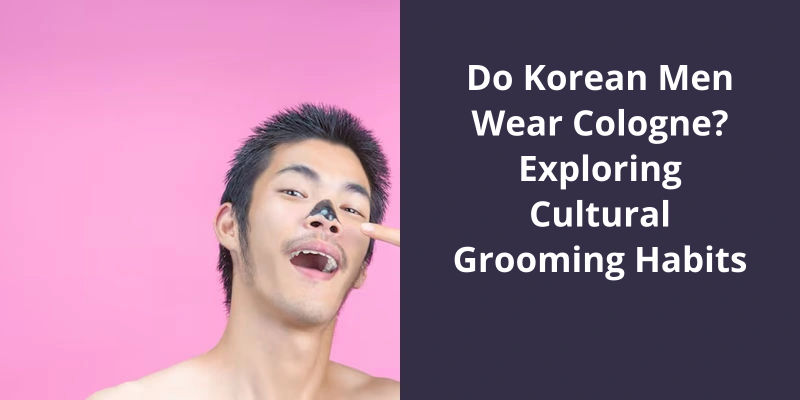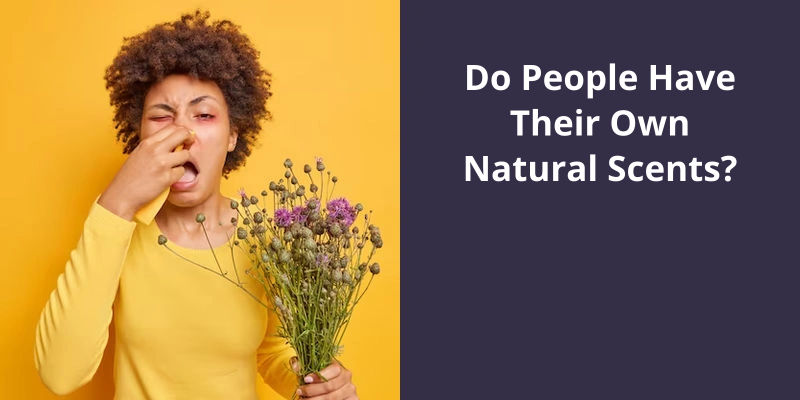Yes, Korean men do wear cologne. Like their counterparts from other parts of the world, many Korean men use cologne as part of their grooming habits. It is, however, important to note that there is a strong preference for light and fresh scents over the typically strong western ones. Additionally, Korea’s grooming industry has boomed in recent years, with a greater focus on men’s products. Skincare also takes precedence over fragrance for many Korean men but using cologne is far from uncommon. The use of fragrance is seen as a personal choice and can vary greatly from individual to individual, much like anywhere else globally.

Do Korean Men Use Perfume?
It’s common for men to use different kinds of fragrances, including cologne, aftershave and perfume, as part of their daily grooming routine. The use of perfume among Korean men isn’t a new trend; rather, it’s been in practice for many years. This practice has been popularized with the introduction of a variety of new fragrances in the market, especially for men.
The perfume industry in Korea has been growing steadily, with many international brands expanding their sales in the country. As such, they can select a fragrance that suits their personal style and preference.
Many men prefer to wear lighter fragrances during the daytime, while those intending to make a lasting impression may opt for stronger scents in the evening. Some more commonly used fragrances are lavender, citrus, and cedarwood scents.
The History of Perfume Use Among Korean Men
Perfume use among Korean men has a long history, dating back to the Joseon Dynasty. During this time, men would wear fragrant oils and powders made from natural ingredients such as pine resin and herbs. The use of perfumes gradually declined during the Japanese colonial period and Korean War, but has seen a resurgence in recent years as more men are embracing grooming and self-care practices. Today, Korean men have access to a wide range of perfumes and colognes, with many brands specifically targeting the male market.
When it comes to cultural differences, even something as seemingly harmless as wearing perfume can cause offense. In Japan, the attitude towards fragrance is vastly different from what’s commonly accepted in Western countries. While perfume may be seen as an essential part of a person’s personal style in some parts of the world, in Japan, it’s a delicately navigated tradition. Therefore, it’s essential to understand the cultural nuances before wearing perfume in Japan.
Is It OK to Wear Perfume in Japan?
While perfume may be a common accessory in other parts of the world, Japan is unique in it’s approach to fragrance. It’s important to understand that the Japanese have a strong culture of respect and consideration for others, which extends to the scents they wear. In Japan, wearing a strong perfume can be seen as a breach of etiquette, as it may cause discomfort or offense to those around you.
This sensitivity to fragrances extends beyond just perfume, and is reflected in other products such as soaps, creams, and even laundry detergents. Japanese ingredients are often used in fragrance-free or low-fragrance formulas, as it’s believed that these are less likely to clash with other smells and irritate those who’re sensitive to fragrances. Additionally, it’s worth noting that Japan has some of the most stringent regulations around the use of fragrances in products, in order to protect public health.
As a general rule of thumb, it’s best to opt for a light, clean scent without overpowering notes. This won’t only show respect for those around you, but also help you assimilate more easily into Japanese culture.
Of course, fragrance is a personal decision and ultimately comes down to individual choice. However, it’s worth remembering that when traveling to another country, it’s important to be aware of cultural differences and to adapt accordingly. While it may be difficult to forgo your favorite scent, it’s possible to find alternative options that will enhance your experience in Japan without causing offense.
Opting for light, understated scents is a safer choice, and will help you avoid any cultural misunderstandings. Ultimately, being respectful of others and their sensitivities will go a long way in creating positive relationships and experiences while in Japan.
The History of Fragrance in Japan and How It Has Evolved Over Time
Fragrance has been an important part of Japanese culture for centuries. From traditional incense ceremonies to modern perfumes, the history of fragrance in Japan is deeply intertwined with the country’s social and cultural development. Over time, fragrances have evolved in Japan, incorporating both native and foreign influences, resulting in a unique and diverse scent culture. Today, Japan is renowned for it’s high-quality fragrances and is home to some of the world’s most famous perfume brands.
The culture and traditions of South Korea are steeped in history and respectfulness. As a result, there are certain practices and conventions that are expected to be followed when it comes to attire. The dress code in Korea is something that visitors and residents alike should be aware of in order to navigate social situations with grace and sensitivity. In this article, we’ll explore the intricacies of Korean dress code and provide you with some guidelines for dressing appropriately in different contexts.
Does Korea Have a Dress Code?
Additionally, South Koreans tend to dress formally for work and business meetings. Men typically wear suits and ties, while women wear modest dresses or suits. This dress code is seen as a sign of professionalism and respect for others.
In schools and universities, there are dress codes in place. School uniforms are mandatory for students in most primary and secondary schools, although there are some exceptions. These uniforms are designed to be practical and comfortable, as well as modest.
In more formal settings, such as weddings and funerals, there are specific dress codes to follow. Black is traditionally worn for funerals, while bright and colorful clothing is worn for weddings. It’s important to research and understand these customs before attending such events.
While there’s no official dress code for everyday wear, it’s still important to be considerate of Korean customs and traditions. This includes dressing modestly, avoiding overly flashy or provocative clothing, and respecting cultural norms and expectations.
By doing so, you can show respect for the culture and the people of Korea.
Fashion Trends and Styles Popular in Korea
- Korean streetwear
- Korean minimalist fashion
- Korean K-fashion
- Korean retro fashion
- Korean oversized clothing
- Korean skinship fashion
- Korean airport fashion
- Korean preppy style
- Korean Hanbok-inspired fashion
- Korean sportswear
- Korean pastel fashion
- Korean traditional patterns (e.g. florals, gradients, dots)
Korean fashion has been making waves in the fashion industry, with it’s unique blend of traditional culture and modern flair. From K-pop idols to Korean drama actors, many Korean men have set trends with their fashion choices. If you’re curious about how to rock Korean fashion as a guy, we’ve got you covered! Here are some style tips and clothing items to emulate the Korean fashion aesthetic.
How to Dress Like a Korean Guy?
If youre looking to dress like a Korean guy, there are a few key pieces you should consider adding to your wardrobe. Firstly, a long-sleeved polo shirt is a versatile option that can be dressed up or down depending on the occasion. You can opt for solid colors or bold prints to make a statement.
Patterned shirts are also a great way to add some interest to your outfits. From florals to bold graphics, Korean men arent afraid to experiment with prints. Button-down shirts are another classic option that can be dressed up or down depending on the material and style. For a more casual look, you can try pairing them with jeans or chinos.
Coats are a must-have for the colder months in Korea, and there are plenty of options to choose from. Statement jackets in bold colors or patterns are a popular choice, while bomber jackets and puffer jackets offer a more practical and functional option for everyday wear.
Ripped jeans are a popular trend in Korea, with many guys opting for distressed styles to add some edge to their outfits. You can pair them with a simple t-shirt or sweater for a casual look, or dress them up with a blazer and dress shoes for a night out.
Footwear is also important when it comes to dressing like a Korean guy. Sneakers are a staple, but you can also consider dress shoes or loafers for a more formal look. Accessories like hats, scarves, and sunglasses can also add some personality to your outfits.
Traditional Korean Fashion Styles and How to Incorporate Them Into Modern Outfits
- Hanbok dresses and skirts paired with modern blouses or t-shirts
- Baji pants with contemporary jackets or sweatshirts
- Cheoson-ot (long jackets) with skinny jeans or leggings
- Bow-inspired accessories such as hairpins or earrings
- Hwarot (wedding robes) reimagined as statement dresses
- Traditional textiles like silk or hanji (mulberry paper) used in modern silhouettes
- Layering: adding a hanbok vest or jeogori (jacket) over a modern outfit
- Incorporating hanbok-style details like knot closures or gat (traditional hat) shapes into modern accessories
Source: 7 Quick Tips To Korean Men Fashion – Kworld Now
South Korea is known for it’s booming beauty industry, with a particular focus on skincare and makeup. However, fragrances and perfumes have also been gaining popularity in recent years, contributing significantly to the country’s overall market size for personal care products. With a projected growth rate in the industry, it’s clear that South Koreans are increasingly interested in exploring different scents and incorporating them into their daily routines.
Is Perfume Popular in South Korea?
Perfume has long been associated with luxury and indulgence, and this is certainly the case in South Korea. The market for fragrances and perfume in the country has been steadily growing over the past few years, driven by a combination of factors such as rising disposable income, changing consumer attitudes towards personal grooming, and a growing interest in western beauty trends.
For example, there’s a strong focus on natural fragrances and ingredients, with many consumers preferring scents that are inspired by Korean botanicals such as green tea or ginseng. Additionally, perfume is often marketed more as a lifestyle product than simply as a beauty accessory, with many brands emphasizing the emotional experience of wearing a particular scent.
Popular Fragrance Brands in South Korea
- Etude House
- Innisfree
- Mamonde
- The Face Shop
- Hera
- Missha
- Belif
- April Skin
- Dr. Jart+
- AmorePacific
Conclusion
In conclusion, the survey results suggest that there’s a growing trend of perfume usage among South Korean men. While some may see it as purely aesthetic, the use of perfume or cologne can also speak to a person's sense of self-care and personal hygiene. The fact that Korean men are using an average of 7 cosmetic products further highlights the importance of grooming and physical appearance in their culture. As with any personal choice, the decision to wear perfume should be respected and celebrated as a form of self-expression.





